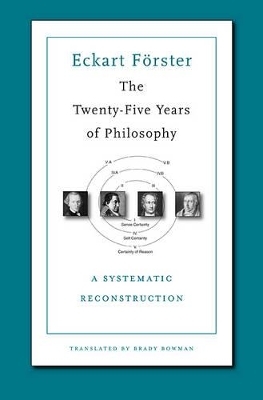
The Twenty-Five Years of Philosophy
A Systematic Reconstruction
Seiten
2012
Harvard University Press (Verlag)
978-0-674-05516-2 (ISBN)
Harvard University Press (Verlag)
978-0-674-05516-2 (ISBN)
- Titel ist leider vergriffen;
keine Neuauflage - Artikel merken
Kant declared that philosophy began in 1781 with his Critique of Pure Reason. In 1806 Hegel announced that it had been completed. Forster assesses the steps that led from Kant's "beginning" to Hegel's "end" and concludes that both Kant and Hegel were indeed right. His study reveals Goethe's significant contribution to post-Kantian thinking.
Kant declared that philosophy began in 1781 with his "Critique of Pure Reason". In 1806 Hegel announced that philosophy had now been completed. Eckart Forster examines the reasons behind these claims and assesses the steps that led in such a short time from Kant's "beginning" to Hegel's "end." He concludes that, in an unexpected yet significant sense, both Kant and Hegel were indeed right. "The Twenty-Five Years of Philosophy" follows the unfolding of a key idea during this exceptionally productive period: the Kantian idea that philosophy can be scientific and, consequently, can be completed. Forster's study combines historical research with philosophical insight and leads him to propose a new thesis. The development of Kant's transcendental philosophy in his three Critiques, Forster claims, resulted in a fundamental distinction between "intellectual intuition" and "intuitive understanding." Overlooked until now, this distinction yields two takes on how to pursue philosophy as science after Kant.
One line of thought culminates in Fichte's theory of freedom (Wissenschaftslehre), while the other - and here Forster brings Goethe's significance to the fore - results in Goethe's transformation of the Kantian idea of an intuitive understanding in light of Spinoza's third kind of knowledge. Both strands are brought together in Hegel and propel his split from Schelling. Forster's work makes an original contribution to our understanding of the classical era of German philosophy - an expanding interest within the Anglophone philosophical community.
Kant declared that philosophy began in 1781 with his "Critique of Pure Reason". In 1806 Hegel announced that philosophy had now been completed. Eckart Forster examines the reasons behind these claims and assesses the steps that led in such a short time from Kant's "beginning" to Hegel's "end." He concludes that, in an unexpected yet significant sense, both Kant and Hegel were indeed right. "The Twenty-Five Years of Philosophy" follows the unfolding of a key idea during this exceptionally productive period: the Kantian idea that philosophy can be scientific and, consequently, can be completed. Forster's study combines historical research with philosophical insight and leads him to propose a new thesis. The development of Kant's transcendental philosophy in his three Critiques, Forster claims, resulted in a fundamental distinction between "intellectual intuition" and "intuitive understanding." Overlooked until now, this distinction yields two takes on how to pursue philosophy as science after Kant.
One line of thought culminates in Fichte's theory of freedom (Wissenschaftslehre), while the other - and here Forster brings Goethe's significance to the fore - results in Goethe's transformation of the Kantian idea of an intuitive understanding in light of Spinoza's third kind of knowledge. Both strands are brought together in Hegel and propel his split from Schelling. Forster's work makes an original contribution to our understanding of the classical era of German philosophy - an expanding interest within the Anglophone philosophical community.
Eckart Forster is Professor of Philosophy at Johns Hopkins University. He is also Honorary Professor of Philosophy at the Humboldt University in Berlin. Brady Bowman is Assistant Professor of Philosophy at Pennsylvania State University.
| Erscheint lt. Verlag | 15.3.2012 |
|---|---|
| Übersetzer | Brady Bowman |
| Zusatzinfo | 1 halftone, 13 line illustrations |
| Verlagsort | Cambridge, Mass |
| Sprache | englisch |
| Maße | 156 x 235 mm |
| Gewicht | 666 g |
| Themenwelt | Geisteswissenschaften ► Philosophie ► Geschichte der Philosophie |
| Geisteswissenschaften ► Philosophie ► Philosophie der Neuzeit | |
| ISBN-10 | 0-674-05516-0 / 0674055160 |
| ISBN-13 | 978-0-674-05516-2 / 9780674055162 |
| Zustand | Neuware |
| Haben Sie eine Frage zum Produkt? |
Mehr entdecken
aus dem Bereich
aus dem Bereich
die kolonialen Wurzeln der französischen Theorie
Buch | Hardcover (2024)
Matthes & Seitz Berlin (Verlag)
CHF 41,90
oder Das Leben Montaignes in einer Frage und zwanzig Antworten
Buch | Softcover (2023)
C.H.Beck (Verlag)
CHF 25,20


